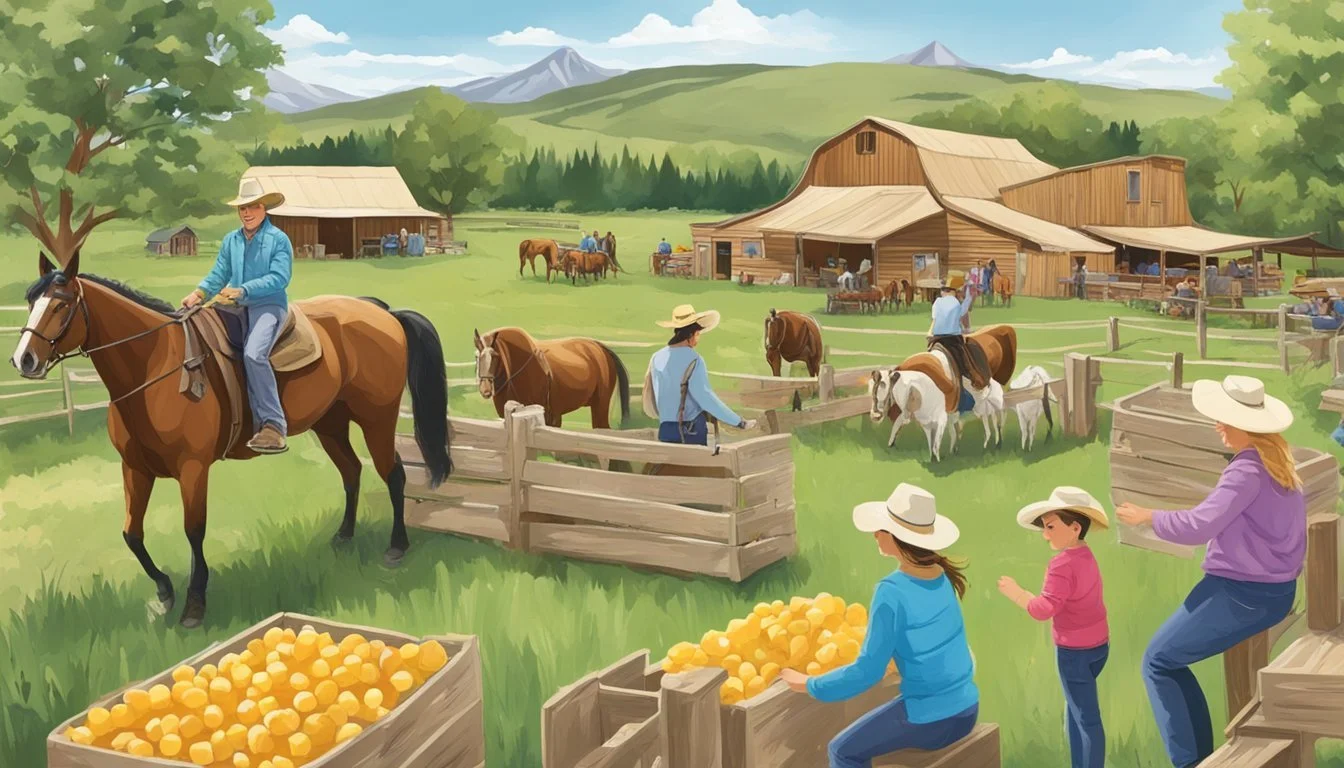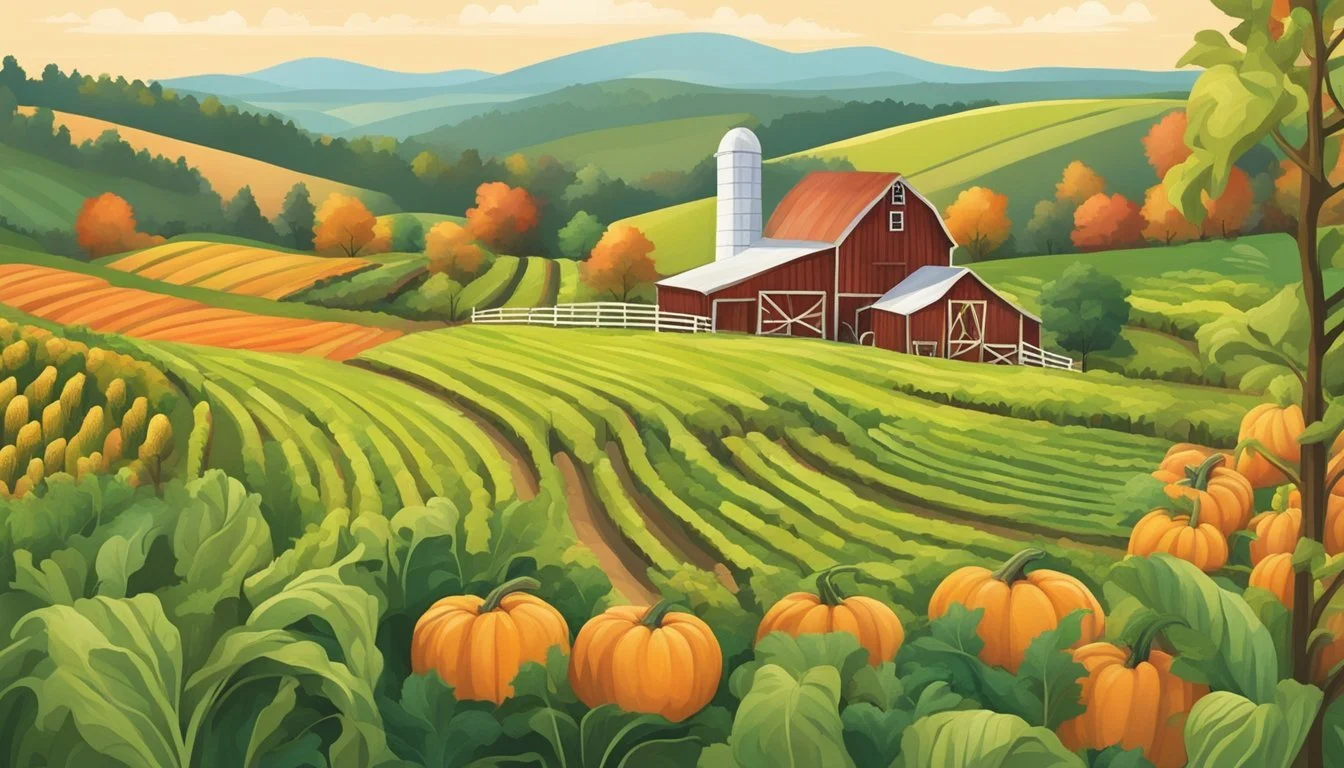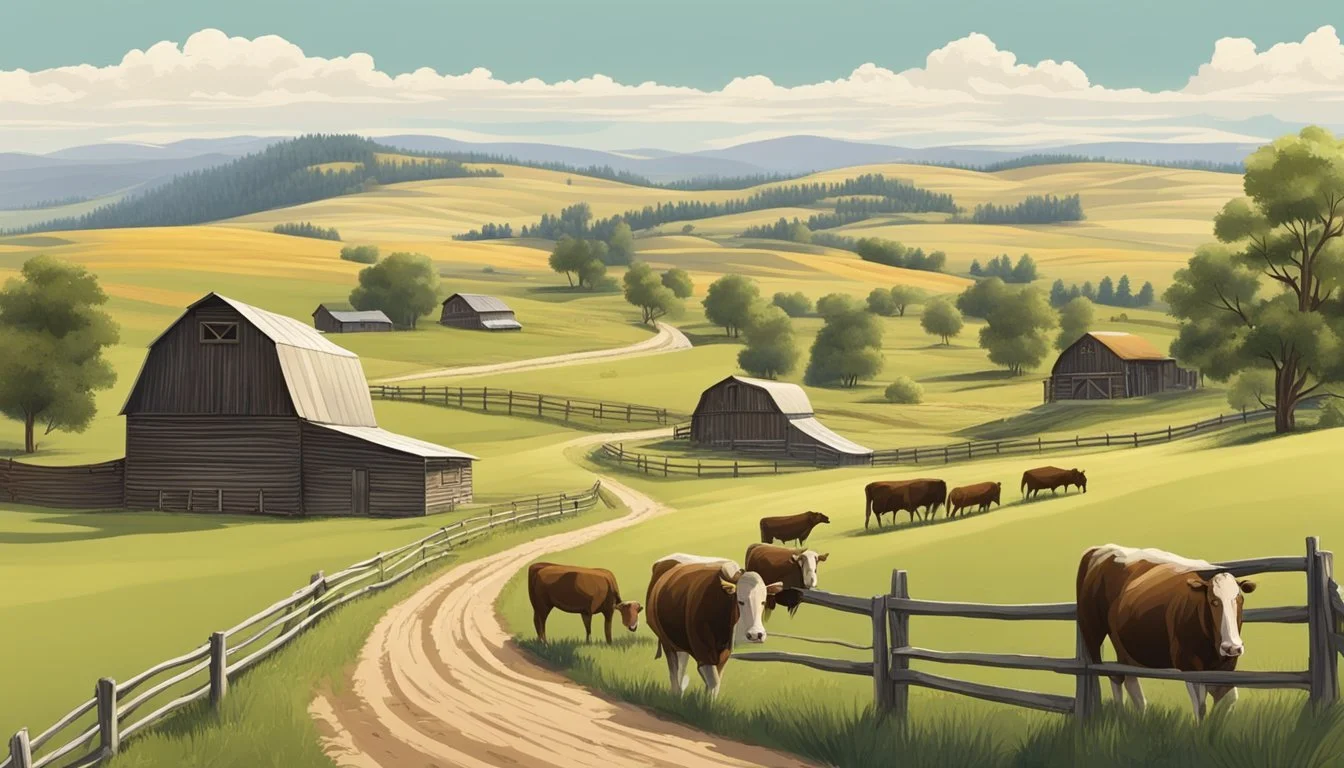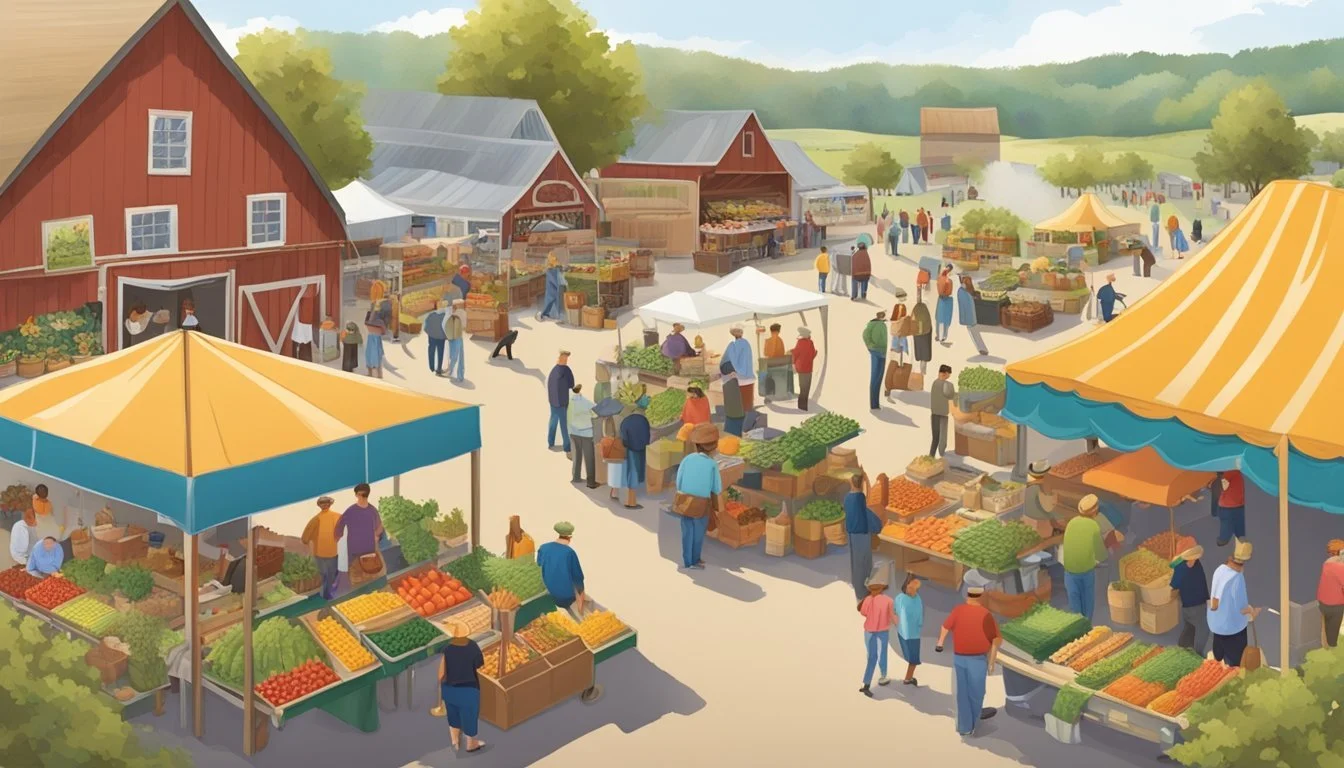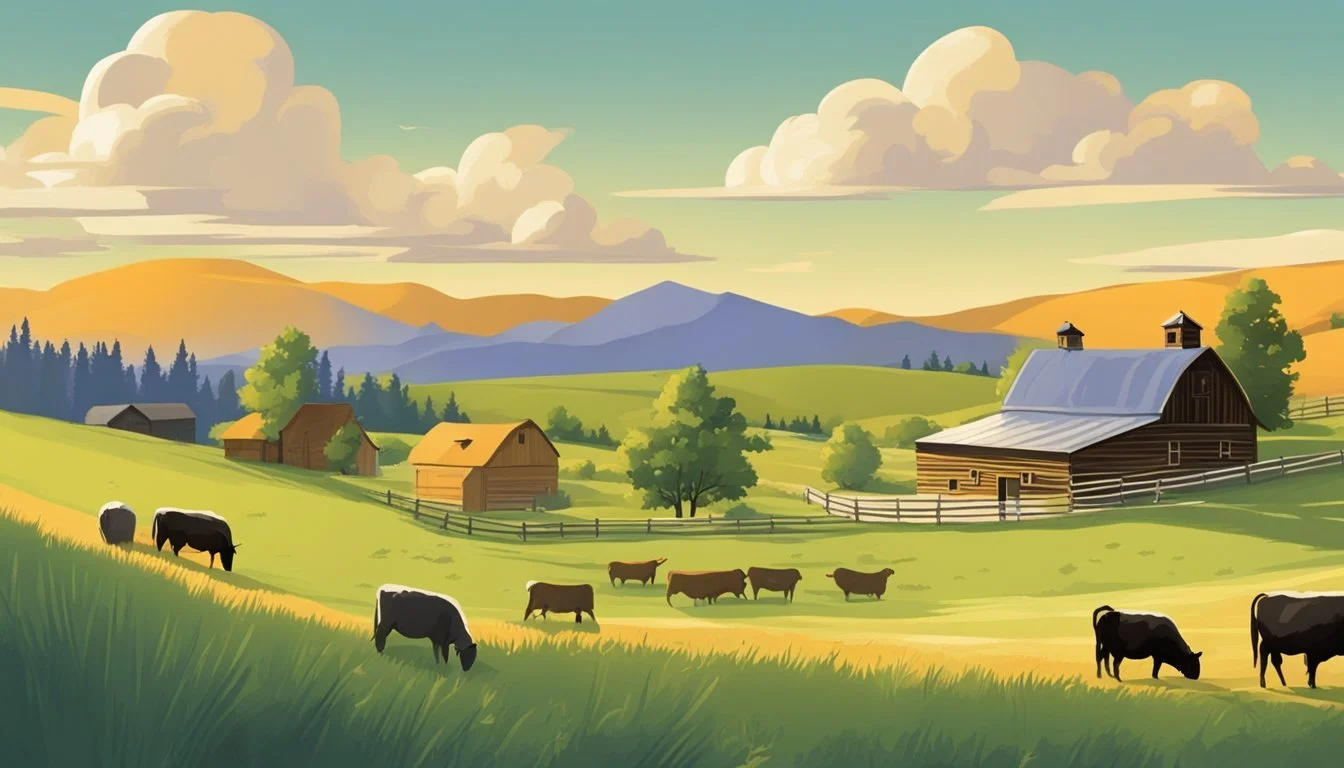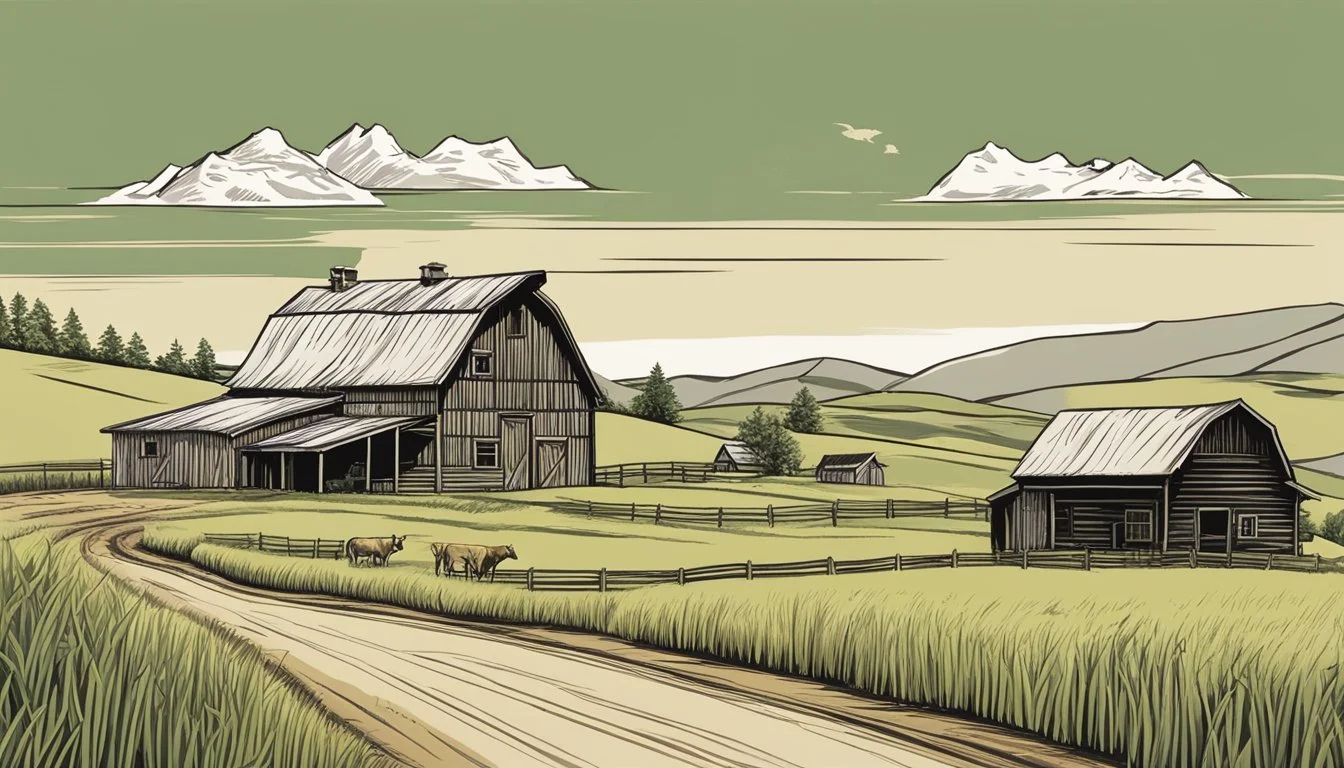Agritourism in Wyoming
Embracing Rural Charm and Adventure
Agritourism in Wyoming combines the state's agricultural heritage with its stunning landscapes to create experiences that immerse visitors in the rural way of life. Wyoming's economy traditionally revolves around three pillar industries: energy, agriculture, and tourism. In recent years, however, agritourism has emerged as a growing sector, offering a new avenue for farmers and ranchers to diversify their income and for tourists to engage with the state's rich cultural heritage. With its vast open spaces and strong agricultural roots, Wyoming provides a unique backdrop for a range of agritourism activities.
Wyoming's agritourism spots appeal to a variety of interests, from those wanting to learn about local food production to others seeking hands-on experiences in the countryside. This rise in agritourism has not only provided financial benefits to the local communities but has also enriched Wyoming’s tourism offerings. Agritourism attractions include working ranches where visitors can participate in ranching activities, educational tours that explain the journey of produce from farm to table, and even specialty lodging options that allow guests to stay on working farms or ranches.
The state's growing agritourism sector is appealing for its breadth of experience it offers. From the unique bison (What wine goes well with bison?) train tour at Terry Bison Ranch Resort to rural dude ranches like Darwin Ranch nestled in the Bridger-Teton Forest, Wyoming's agritourism delivers authentic experiences that reflect the spirit of the West. Visitors get firsthand knowledge of farm operations and the opportunity to appreciate Wyoming's natural beauty while contributing to the sustainability of local farms and communities.
Overview of Agritourism in Wyoming
In Wyoming, agritourism has demonstrated substantial growth, leveraging the state's rich agricultural heritage to foster rural development and economic prosperity.
Defining Agritourism
Agritourism in Wyoming marries the agricultural lifestyle with the tourism industry, providing visitors with immersive experiences on farms and ranches. These experiences range from cattle drives to ample opportunities for direct sales of produce, inviting tourists to engage with Wyoming's agrarian roots.
Historical Context and Development
The evolution of agritourism in Wyoming mirrors the broader shift in agriculture towards diversification and sustainability. Driven by a desire to preserve traditional practices, Wyoming's farmers and ranchers began to open their doors to the public, offering authentic insights into rural life. This initiative has since burgeoned, transforming the way in which the state's agricultural history is shared and celebrated.
Economic Impact on Wyoming
Economically, agritourism represents a significant source of income for Wyoming's rural communities. According to data from the Census of Agriculture, Wyoming's agritourism revenue more than doubled from 2012 to 2017, totaling $29.1 million in the latter year. This not only underscores the industry's vitality but also its crucial role in the state's economic landscape.
Key Agritourism Activities
Agritourism in Wyoming offers a plethora of activities that cater to a variety of interests, from hands-on ranch life experiences to serene engagements with nature and educational pursuits.
Farm and Ranch Visits
Visitors to Wyoming's agritourism destinations can immerse themselves in authentic ranch activities. For instance, Double Rafter Cattle Drives provides guests with a genuine 1880s cattle drive experience across an expansive 60,000 acres. Such visits allow people to participate in daily farm chores, observe livestock care, and understand the operations of a working ranch.
Recreational Offerings
Recreation forms a significant component of Wyoming's agritourism, including a range of activities like guided wildflower hikes and European-style pheasant hunts. Horseback riding adventures are notably popular, giving guests a chance to explore the scenic landscapes much like the settlers did. Recreational offerings are designed to provide both excitement and relaxation in a rural setting.
Educational Programs
Educational programs at farms and ranches impart knowledge about agricultural practices and the origin of food. Some agritourism entities focus on providing insights into beef cattle and sheep farming, showcasing the state's rich agricultural heritage. These programs often cater to both children and adults, promoting awareness of agricultural sustainability and food production processes.
Seasonal Attractions
Wyoming’s agritourism showcases a variety of seasonal attractions that offer visitors an immersive experience in the state's robust agricultural heritage. From the rejuvenating activities of spring to the captivating charm of winter, each season presents unique ways to engage with farm life.
Spring Blossoms and Planting
During spring, the Wyoming countryside becomes a painter's palette with blooming flowers and budding crops. Visitors can partake in hands-on experiences such as planting initiatives and agricultural education tours to witness the cycle of growth firsthand. Agritourism spots may offer activities like flower picking in vibrant fields, perfect for families and photographers alike.
Harvest Season Festivities
When fall arrives, Wyoming agritourism shines with pumpkin patch outings and corn mazes. These festive venues often feature other attractions such as hayrides, local craft markets, and cooking demonstrations showcasing Wyoming's harvest produce. Agrotourism sites spotlight the importance of agriculture with educational exhibits on crop harvesting techniques and conservation.
Winter Experiences
The winter months cloak Wyoming's landscape in snow, but agritourism doesn't hibernate. Visitors may revel in the serene beauty of snow-blanketed farms and engage in seasonal activities like snow tubing. Winter tours might also offer insights into how farms manage livestock and maintain operations despite the chilly weather, highlighting the resilience of Wyoming's agriculture.
Types of Agritourism Enterprises
In Wyoming, agritourism enterprises capitalize on the state's rich agricultural heritage, providing visitors authentic experiences that range from cattle handling to crop harvesting. The establishments often emphasize education, engagement, and hands-on activities.
Cattle and Dude Ranches
Cattle ranches in Wyoming invite guests to partake in cattle drives and experience the lifestyle of a working ranch. Dude ranches, such as Double Rafter Cattle Drives in Ranchester, Wyoming, offer a more tailored experience that may include horseback riding, fly fishing, and hiking. Visitors can immerse themselves in the culture that harks back to the 1880s, combining the rustic with the comfortable.
Primary activities: Cattle herding, horseback riding
Highlights: Authentic 1880s cattle drive experiences
Crop-Based Operations
Agritourism isn't limited to animal-based activities. Wyoming's crop-based operations let visitors participate in seasonal activities like hay harvesting. These enterprises are an opportunity for travelers to learn about local agriculture, including the cultivation and processing of various crops integral to Wyoming's agrarian economy.
Primary crops: Hay, small grains
Seasonal events: Harvest festivals, farm tours
Dairy and Creameries
Dairy farms and creameries in Wyoming offer a closer look at dairy production from cattle and sometimes even sheep, showcasing the processes behind milk, cheese, and cream. They emphasize educational tours that may include milking demonstrations and tastings. Such experiences connect visitors to the source of the dairy products they enjoy every day.
Primary products: Milk, cheese, cream
Educational offerings: Milking demonstrations, cheese-making workshops
Support and Infrastructure
Agritourism in Wyoming benefits strongly from a framework of support and modernization efforts, involving government programs and educational institutions, which underscore its growth and development in the state’s rural areas.
Government and Educational Support
The U.S. Department of Agriculture (USDA) plays a pivotal role in agritourism's rise in Wyoming by conducting and disseminating valuable data such as its 2017 Census Report, which highlights the industry's growth trends. Sheridan College, a local educational institution, contributes by equipping students with the requisite knowledge and skills, potentially offering courses and outreach programs tailored for agritourism entrepreneurs.
Role of Agricultural Technology
Technological advancements are integral in propelling Wyoming's agritourism to higher levels of efficiency and visitor engagement. The utilization of technology in areas such as:
Online marketing and social media for greater visibility.
Booking and reservation systems for streamlined operations.
allows agritourism entities to enhance their reach and improve the visitor experience. Innovations like digital credential systems, as fostered by the Wyoming Innovation Partnership (WIP), aim to modernize the hospitality and agricultural sectors, ensuring they stay competitive and adaptable.
Business Aspects of Agritourism
The business aspects of agritourism in Wyoming encompass diverse revenue streams, targeted marketing, and meticulous event planning, all contributing to the sustainable viability and growth of agricultural businesses within the community.
Revenue Streams and Viability
Agritourism offers multiple avenues for income generation beyond traditional farming practices. In Wyoming, direct sales enable consumers to purchase goods straight from the farmers, ensuring freshness and supporting the local economy. Educational tours provide additional revenue while fostering a connection between the agricultural community and the public. Hospitality services, such as farm stays, offer immersive experiences, with opportunities for visitors to participate in ranch activities, thereby increasing the ranch's income. Lastly, outdoor activities on farms, including wildlife tours or horseback riding, serve to enhance the visitor experience while contributing financially to the enterprise.
Direct Sales: Products sold directly to consumers
Educational Tours: School and public tours for learning about farming
Hospitality: Accommodations and activities for guests
Outdoor Recreation: Adventure and activities aligned with farm features
Marketing and Community Engagement
Effective marketing strategies are critical for agritourism businesses to attract visitors and create lasting relationships with the community. Digital presence, through websites and social media, remains essential, allowing tourists to discover what Wyoming has to offer in terms of authentic agritourism experiences. Participation in local events and collaboration with tourism boards can bolster a farm's presence in the community, contributing to a stronger agricultural business model.
Digital Marketing: Leveraging websites and social media for visibility
Community Collaboration: Working with local entities to enhance presence
Event Planning and Hospitality
Successful event planning and hospitality services form the core of agritourism in Wyoming. Farms must design events that highlight their unique offerings, such as cattle drives or harvest festivals. Incorporating local culture and history can add depth to the visitor experience. Providing quality hospitality in the form of comfortable lodging and engaging activities can heighten the appeal of agritourism locations, leading to increased customer satisfaction and revenue.
Event Design: Crafting unique farm-based events
Hospitality Execution: Ensuring comfortable and authentic farm stays
Cultural and Lifestyle Factors
Agritourism in Wyoming not only promotes the state's agricultural prowess but also weaves together the cultural tapestry that defines the rural way of life. It underscores the significance of family operations while offering a unique blend of rural lifestyle and amenities to its visitors.
Family Operations and Traditions
Family-owned farms and ranches serve as the cornerstone of Wyoming's agritourism. Often spanning generations, these family operations are a testament to the traditions that have shaped Wyoming's agricultural sector. Visitors may find themselves staying in cozy cabins or participating in the day-to-day farm activities that are part of the family's heritage. These experiences provide a hands-on understanding of the dedication behind maintaining a farm or ranch.
Gardens: Many family farms offer tours of their gardens, displaying a rich variety of local produce that underscores their commitment to sustainable agriculture.
Rural Lifestyle and Amenities
The rural lifestyle in Wyoming brings with it a unique set of amenities that cater to the agritourism sector. Comfortable accommodations such as cabins outfitted with modern conveniences sit harmoniously within a bucolic landscape. Guests can enjoy the tranquility of the countryside while also partaking in activities such as horseback riding or fishing.
Amenities: Besides lodging, agritourism entities enrich visitors' stays with:
Local food experiences in farm-to-table dining
Educational opportunities about sustainable living and agriculture
Each agritourism site reflects a blend of rural charm and practicality, providing guests with a genuine slice of Wyoming's cultural and lifestyle fabric.
Legal and Safety Considerations
Agritourism in Wyoming is subject to various legal frameworks to ensure the safety of participants and the protection of farm operators. State immunity laws offer clarity on the definition of agritourism, specifying the activities covered and the necessary conditions to qualify for liability safeguards.
Risk management is a critical component, necessitating agritourism operators to create comprehensive plans addressing different domains of potential liability:
Site Safety: Operators must assess and mitigate risks, such as uneven terrain or animal interactions, to provide a secure environment for visitors.
Product Safety: If agritourism involves selling produce or other goods, complying with health and safety standards is paramount.
Employee Training: Staff must be well-informed and trained in safety protocols to ensure both their safety and that of the guests.
Financial Protections: Adequate insurance coverage is crucial to shield the business from potential claims arising from accidents or injuries.
Legal considerations go beyond risk management. Operators must:
Adhere to Zoning Codes: Ensure agritourism activities fit within local land-use regulations.
Comply with Regulations: Follow all relevant laws, including those related to disability accommodations and food service.
Obtain Necessary Permits: Secure the correct tax permits and other authorizations pertinent to the operation.
Safety programs cater to various age groups, emphasizing age-appropriate engagement and education. It's critical that agritourism entities uphold stringent safety protocols for all participants, ensuring a secure and enjoyable experience while maintaining a solid legal standing.
Consistent, clear communication about safety guidelines to guests is not only a legal imperative but a practical necessity in fostering a safe, enjoyable agritourism experience.
Educational Impact
Agritourism in Wyoming provides structured educational programs that enhance agricultural understanding among participants.
Learning Opportunities
Agritourism ventures in Wyoming offer a variety of hands-on learning experiences for individuals seeking to gain practical knowledge in agriculture. Participants engage directly with farming activities, from planting to harvesting, gaining insight into the entire agricultural process. They also learn about the local food systems, environmental stewardship, and the economic challenges faced by rural communities.
Educational Programs:
Sheridan College: Offers tailored programs that combine classroom theory with real-world farming practices.
Field Visits: Students visit agritourism sites to observe and participate in day-to-day farm operations.
Certificates and Training
Wyoming’s educational institutions and agritourism organizations collaborate to provide certifications that validate the skills gained in agritourism-related activities. These include various levels of certificates that recognize mastery in specific agricultural skills or general farm management.
Certificate Programs:
Sheridan College: Provides certification in areas such as sustainable food systems and agricultural business management.
On-site Training: Some agritourism farms offer their own certification for completing training courses in specialized agricultural fields.
Formal training sessions ensure that individuals are not only enjoying the agritourism experience but also walking away with verifiable skills and knowledge that can enhance their careers or personal endeavors in agriculture.
Challenges and Growth of Agritourism
Agritourism represents a growth opportunity for Wyoming's rural communities. This melding of agriculture and tourism aligns with the state's strong economic pillars—energy, agriculture, and tourism. The U.S. Department of Agriculture's 2017 Census indicates a rising trend in Wyoming's agritourism sector.
Growth:
Wyoming's expansive landscapes offer unique experiences for agritourism, drawing visitors seeking authenticity.
The state recorded significant numbers of farms offering direct sales or agritourism activities.
Challenges:
Accessibility and regional differences impact the agritourism sector, with varying levels of visitor access throughout the state.
Agritourism operators must navigate zoning laws, liability issues, and marketing challenges to effectively reach potential tourists.
Factor Impact on Agritourism Regional Access Varies; some areas have limited access to tourists due to geographic and infrastructural challenges. Legal Framework Complex; zoning and liability considerations can deter or complicate farm-based tourism activities. Marketing Critical; effective promotion is essential to attract visitors and requires adequate tools and strategies.
Tools for Growth:
Effective marketing strategies are crucial, with an emphasis on digital presence to bolster visibility.
Collaboration with tourism boards and local communities can enhance reach and development.
Investment in infrastructure may improve access, thereby increasing tourist traffic and interest.
Wyoming's agritourism is poised for growth, despite the challenges. With strategic use of tools and adaptation to regulations, the industry can thrive and contribute significantly to the state's economic well-being.
Local Agritourism Initiatives
Wyoming is seeing a burgeoning growth in its agritourism sector, with various local programs fostering the connection between agriculture and tourism. This growth taps into the state's rich tradition of ranching and farming, offering immersive experiences for visitors.
Afton and Laramie Programs
Afton, a small community in Lincoln County, has initiated agritourism ventures focusing on farm-based recreation. They offer visitors a chance to immerse themselves in local agricultural practices through activities such as farm stays and educational tours. This approach allows tourists to experience rural life authentically while providing an additional stream of revenue for farmers.
In contrast, Laramie has developed a series of programs that emphasize educational outreach alongside tourism. Utilizing the region's existing agricultural base, these programs include school tours and the promotion of 'pick-your-own' produce experiences. By engaging educational tactics, Laramie fosters deeper understanding and appreciation of the agricultural sector among visitors and locals alike.
Statewide Agritourism Movements
Wyoming's statewide initiatives are marked by the collaboration between different stakeholders including farmers, ranchers, and tourism boards. A key goal is to create cohesive experiences such as cattle drives, guided hunts, and lodging facilities that allow visitors to enjoy the state's beautiful landscapes while participating in authentic rural activities.
One of the prominent movements is to integrate agritourism into the broader tourism strategies that highlight the state's rich heritage. Such integrations are seen as means not just to diversify the economy, but also to preserve the character of Wyoming's rural communities. These initiatives serve as a model for how agritourism can support both economic development and cultural preservation.


